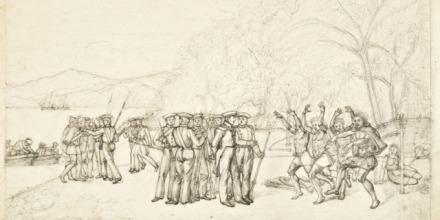
Māori perform a haka as Russians arrive at a fishing settlement in New Zealand’s Queen Charlotte Sound in mid-1820.
Dr Hilary Howes’ current research project ‘Skulls for the Tsar’ aims to produce the first detailed investigation of the acquisition of Indigenous human remains from Australia, New Zealand and the broader Pacific by the Russian Empire during the long 19thcentury. It expects to generate new knowledge about Imperial Russia’s scientific networks, anthropological collections and underlying intellectual traditions. Expected outcomes include a better understanding of Russian perceptions of Indigenous peoples and the development of a new way of writing histories about the collecting of Indigenous human remains. Working directly with affected communities, this project should provide significant benefits to Indigenous peoples seeking the return of their ancestors' remains from overseas institutions.
This research is funded by the Australian Research Council’s Discovery Early Career Research Award (DECRA) scheme as DE210101721.